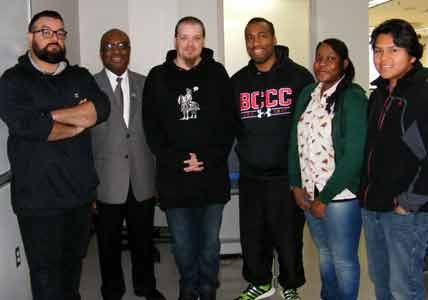As a 2015 National Cyber Security Awareness Month (NCSAM) Champion, Baltimore City Community College (BCCC) spent the entire month promoting online safety as well as new degree and certificate programs addressing the huge demand for highly skilled cyber security professionals.
Observed every October, National Cyber Security Awareness Month was created as a collaborative between government and industry to spread public awareness of the dangers that exist online and how to avoid them. To become a NCSAM Champion, BCCC committed itself not only to increasing cyber security awareness but to preparing students for careers in one of the nation’s fastest-growing fields.
According to the U.S. Bureau of Labor Statistics, employment of information security analysts is projected to grow 37 percent from 2012 to 2022, much faster than the average for all occupations. The new BCCC cyber security associate degree and certificate will help meet this demand as well as workforce needs throughout the city of Baltimore and state of Maryland, considered to be the nation’s cyber security epicenter because of its proximity to the National Security Agency, defense installations and contractors.
The BCCC Cyber Security and Assurance Program began offering its first set of classes this semester. The program creates a pathway to related baccalaureate degree programs at four-year institutions and connects students to internship and job opportunities.
The program has three tracks:
•Cyber-Technology Pathways Across Maryland (CPAM)-certified Pre-Cyber Security training courses for students seeking an entry-level job
•A credit-based Certificate program
•Cyber Security and Assurance Associate of Applied Science (AAS) degree
The 25-credit certificate program can be completed within one year.
According to Chima Ugah, head of IT programs at BCCC and coordinator of the new program, “Cybersecurity is an integral part of our daily living to protect individual and corporate data. The BCCC Cyber Security and Assurance program will address the hardware of computer infrastructure as well as the planning, implementation and auditing of security systems on multiple platforms,” he said. “The ethical hacking and computer forensic courses provide the knowledge of a digital detective related to computer crimes. We expect the demand to be high once the public knows about the new curriculum.”
A record 79 percent of U.S. businesses reported a cyber security incident in the last year, and the 238,158 postings for cyber security jobs in 2014 represented an increase of 91 percent from 2010, according to a new report released this week by the National Cyber Security Alliance and Raytheon, a global technology company.
Baltimore ranks ninth in the concentration of cyber security professionals while the Baltimore-Washington corridor ranks second overall, according to the Economic Alliance of Greater Baltimore. More cyber security jobs are available in Maryland than anywhere else.
“There are myriad job responsibilities for students in Cyber Security and Assurance. The positions are dynamic and continue to evolve as this field continues to mature,” Professor Ugah said.
As part of Cyber Security Awareness Month, BCCC hosted a month-long online and on-campus contest, “How Cyber-Savvy Are You?” A Twitter chat on the ins and outs of Cyber Security Education was also held in which Professor Ugah fielded questions on the new program and career options.
